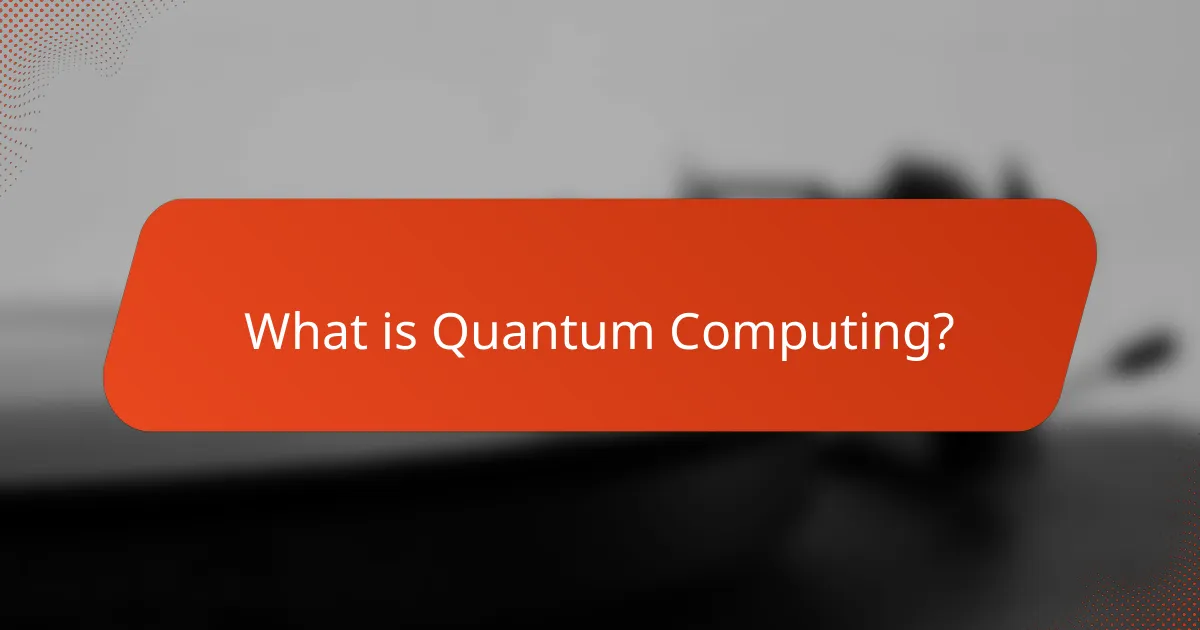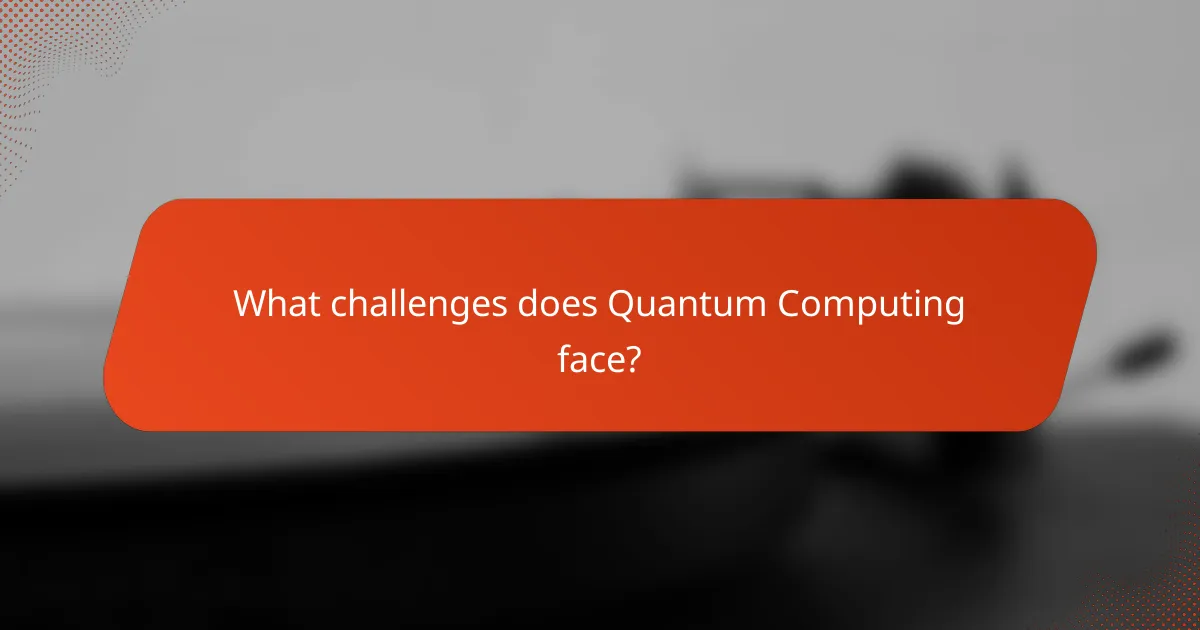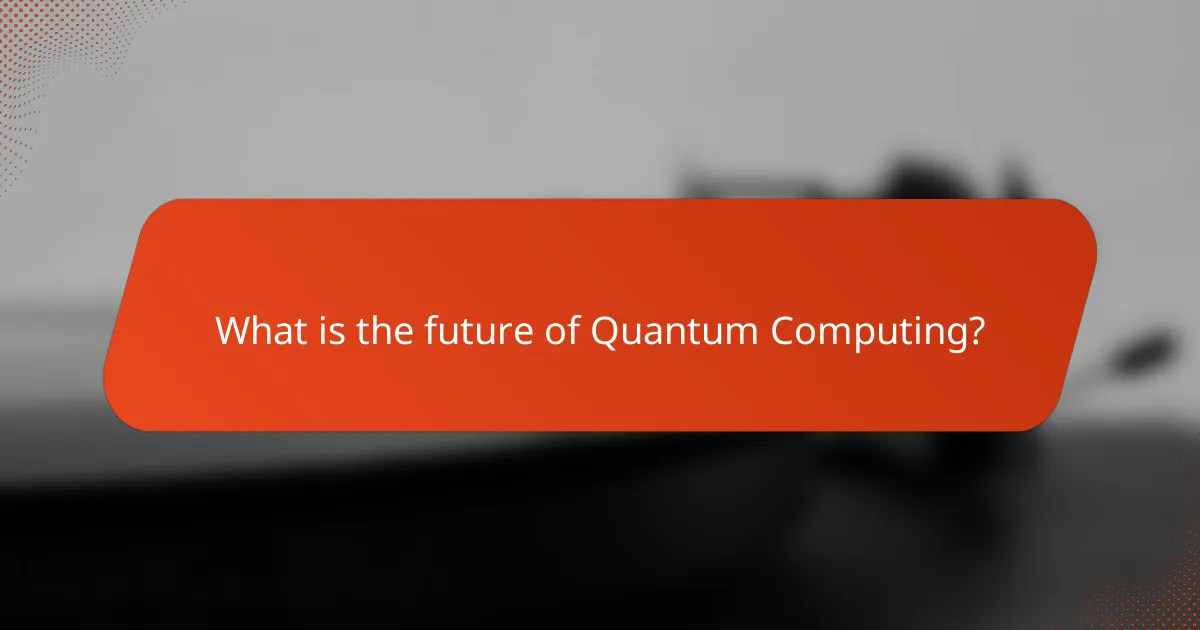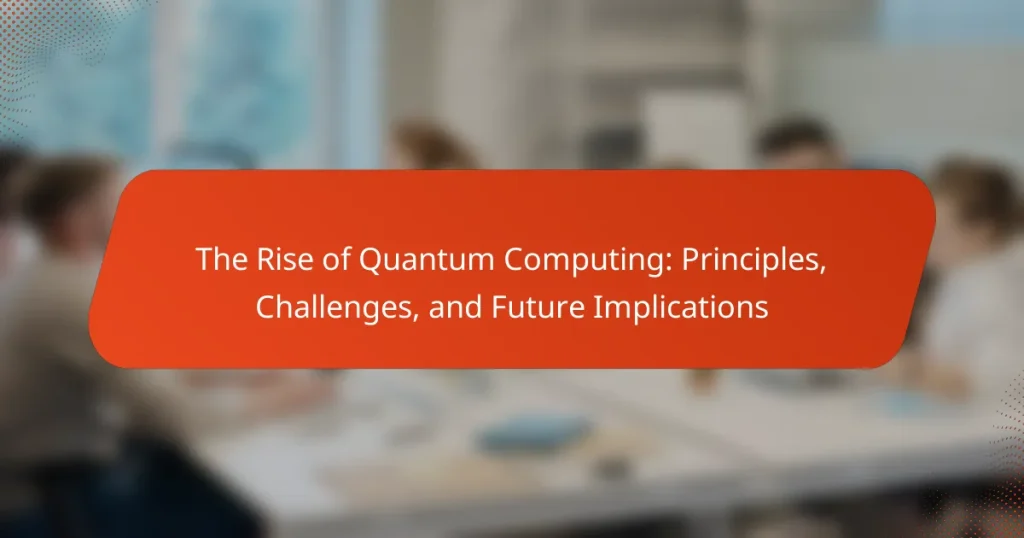Quantum computing is a groundbreaking technology that leverages the principles of quantum mechanics to process information using quantum bits, or qubits, which can exist in multiple states simultaneously. This capability allows quantum computers to perform complex calculations at unprecedented speeds, making them potentially transformative for various fields, including cryptography, materials science, and artificial intelligence. Despite its promise, quantum computing faces significant challenges, such as high error rates in qubits, difficulties in scaling systems, and the need for skilled personnel. Ongoing research and substantial investments from tech companies and governments aim to address these issues and unlock practical applications, with predictions indicating that by 2030, quantum computing could lead to significant advancements in optimization and cryptography.

What is Quantum Computing?
Quantum computing is a revolutionary technology that uses quantum mechanics to process information. Unlike classical computers, which use bits as the smallest unit of data, quantum computers use quantum bits or qubits. Qubits can exist in multiple states simultaneously, allowing quantum computers to perform complex calculations at unprecedented speeds. This capability stems from principles like superposition and entanglement. Superposition enables qubits to represent both 0 and 1 at the same time. Entanglement allows qubits that are entangled to be correlated with one another, regardless of distance. These properties make quantum computing potentially transformative for fields such as cryptography, materials science, and artificial intelligence. Research by IBM and Google has demonstrated quantum supremacy, showing that quantum computers can solve specific problems faster than classical computers.
How does Quantum Computing differ from classical computing?
Quantum computing differs from classical computing primarily in its use of quantum bits or qubits. Classical computing relies on bits, which represent either a 0 or a 1. In contrast, qubits can exist in multiple states simultaneously due to the principle of superposition. This allows quantum computers to process a vast amount of information at once.
Furthermore, quantum computing employs entanglement, a phenomenon where qubits become interconnected. This enables qubits to work together in ways that classical bits cannot. As a result, quantum computers can solve complex problems much faster than classical computers. For example, quantum algorithms like Shor’s algorithm can factor large numbers exponentially faster than the best-known classical algorithms.
Overall, the fundamental differences in how quantum and classical systems process information lead to significantly different capabilities and performance levels.
What are the fundamental principles of quantum mechanics relevant to Quantum Computing?
The fundamental principles of quantum mechanics relevant to quantum computing include superposition, entanglement, and quantum interference. Superposition allows quantum bits, or qubits, to exist in multiple states simultaneously. This property enhances computational power by enabling parallel processing. Entanglement creates a correlation between qubits, meaning the state of one qubit directly affects another, regardless of distance. This principle is crucial for quantum communication and cryptography. Quantum interference enables the manipulation of probability amplitudes, allowing certain outcomes to be amplified while others are diminished. These principles collectively form the foundation for quantum algorithms and technologies, significantly improving problem-solving capabilities compared to classical computing.
What are qubits and how do they function?
Qubits are the fundamental units of quantum information in quantum computing. Unlike classical bits, which represent either a 0 or a 1, qubits can exist in a superposition of states. This means a qubit can represent both 0 and 1 simultaneously. The ability to be in multiple states allows qubits to perform complex calculations more efficiently than classical bits.
Qubits can be realized using various physical systems, such as photons, trapped ions, or superconducting circuits. Quantum entanglement is another property of qubits, where the state of one qubit can depend on the state of another, no matter the distance between them. This interconnectedness enhances computational power and speed.
The behavior of qubits is governed by the principles of quantum mechanics. Operations on qubits are performed using quantum gates, which manipulate their states. These operations are reversible and can create complex quantum algorithms. Research indicates that the use of qubits can potentially solve problems that are intractable for classical computers, such as factoring large numbers or simulating quantum systems.
What are the potential applications of Quantum Computing?
Quantum computing has several potential applications across various fields. In cryptography, it can break traditional encryption methods, enabling secure communication. In drug discovery, quantum computing accelerates simulations of molecular interactions, leading to faster development of new medications. Financial modeling benefits from quantum algorithms that optimize portfolios and assess risk more efficiently. Supply chain optimization can be enhanced through quantum computing, improving logistics and resource allocation. Additionally, quantum computing aids in machine learning, enabling faster data processing and pattern recognition. These applications show promise in revolutionizing industries by solving complex problems that classical computers struggle with.
How can Quantum Computing revolutionize industries such as finance and healthcare?
Quantum computing can revolutionize industries such as finance and healthcare by enhancing data processing capabilities. In finance, it can optimize complex algorithms for risk assessment and fraud detection. Quantum algorithms can analyze vast datasets faster than classical computers. This leads to more accurate predictions and improved investment strategies.
In healthcare, quantum computing can accelerate drug discovery and personalized medicine. It enables the simulation of molecular interactions at unprecedented speeds. This can significantly reduce the time required for clinical trials. Furthermore, quantum computing can improve diagnostic accuracy through advanced data analysis.
Research by IBM indicates that quantum computing could solve problems in seconds that would take classical computers years. This potential for rapid processing and analysis can transform decision-making in both finance and healthcare.
What role does Quantum Computing play in cryptography?
Quantum computing significantly impacts cryptography by threatening traditional encryption methods. Classical cryptographic systems rely on the difficulty of certain mathematical problems, like factoring large numbers. Quantum computers can solve these problems exponentially faster using algorithms like Shor’s algorithm. This capability renders many current encryption techniques, such as RSA, insecure.
Additionally, quantum computing enables new cryptographic methods, such as quantum key distribution (QKD). QKD uses the principles of quantum mechanics to create secure communication channels. This method ensures that any eavesdropping can be detected immediately. Research shows that quantum-safe algorithms are essential for future security. For instance, the National Institute of Standards and Technology (NIST) is working on post-quantum cryptography standards to address these challenges.

What challenges does Quantum Computing face?
Quantum computing faces several significant challenges. One major challenge is error rates in quantum bits, or qubits. Qubits are highly susceptible to environmental noise, which leads to decoherence. This instability can cause errors in calculations. Current error correction methods are complex and require additional qubits. Additionally, scaling quantum systems remains difficult. Building larger quantum computers necessitates advanced technology and materials. Limited availability of skilled personnel also hampers progress in the field. Furthermore, practical applications are still under exploration, which slows adoption. These challenges must be addressed for quantum computing to reach its full potential.
What are the technical obstacles in developing Quantum Computers?
The technical obstacles in developing quantum computers include qubit stability, error rates, and scalability. Qubits are prone to decoherence, which affects their ability to maintain quantum states. High error rates in quantum gates complicate reliable computation. Additionally, scaling up the number of qubits while maintaining performance is challenging.
Thermal noise and electromagnetic interference also disrupt qubit operations. Current technologies require extremely low temperatures to function, adding complexity to systems. Moreover, the lack of standardized architectures hinders widespread development. These factors collectively impede the progress of practical quantum computing solutions.
How do issues like qubit coherence and error rates impact performance?
Qubit coherence and error rates significantly impact quantum computing performance. Qubit coherence refers to the time a qubit maintains its quantum state. Longer coherence times allow for more complex calculations. Error rates indicate the frequency of mistakes during quantum operations. High error rates can lead to incorrect results and limit computational reliability. Together, low coherence and high error rates reduce the effectiveness of quantum algorithms. Research shows that improving coherence times can enhance overall system performance. For instance, a study by Arute et al. (2019) demonstrated that increased coherence times in Google’s Sycamore processor led to successful quantum supremacy experiments.
What are the scalability challenges for Quantum Computing systems?
Scalability challenges for quantum computing systems include qubit coherence, error rates, and interconnectivity. Qubit coherence refers to the time qubits maintain their quantum state before decoherence occurs. Current systems struggle with maintaining coherence for long enough to perform complex calculations. High error rates in quantum gates further complicate scalability. These errors can accumulate, leading to incorrect results. Additionally, interconnectivity among qubits is limited in many architectures. This restricts the ability to perform large-scale computations efficiently. Research indicates that improving qubit fidelity and developing error correction methods are crucial for overcoming these challenges.
What ethical considerations arise from Quantum Computing advancements?
Ethical considerations from Quantum Computing advancements include privacy concerns, security risks, and equitable access. Quantum computing can break current encryption methods. This poses a threat to data security across various sectors. Additionally, it raises questions about the implications of powerful computational capabilities. The potential for misuse in surveillance and cyber-attacks is significant. There is also the risk of exacerbating the digital divide. Access to quantum technology may not be evenly distributed. This could lead to increased inequality in technological benefits. Moreover, ethical frameworks for responsible development are still being established. The rapid pace of advancements complicates regulatory responses.
How might Quantum Computing affect data privacy and security?
Quantum computing may significantly compromise data privacy and security. Its processing power can break traditional encryption methods. Classical encryption relies on mathematical problems that quantum computers can solve quickly. For example, Shor’s algorithm can factor large numbers exponentially faster than classical algorithms. This means that sensitive data, such as financial records and personal information, could be accessed by unauthorized parties. Research by the National Institute of Standards and Technology (NIST) highlights the urgency of developing quantum-resistant encryption standards. As quantum technology advances, existing security protocols may become obsolete. This necessitates immediate action to protect data privacy and security in a quantum future.
What are the implications for job markets and workforce skills?
The rise of quantum computing significantly impacts job markets and workforce skills. Quantum computing creates demand for specialized skills in quantum algorithms, cryptography, and quantum hardware development. Traditional IT roles may evolve as quantum technologies become prevalent. Workers will need to adapt through reskilling and upskilling initiatives. Educational institutions are beginning to incorporate quantum computing into curricula. According to a report by the World Economic Forum, 85 million jobs may be displaced by 2025, while 97 million new roles could emerge. The transition will require a workforce proficient in both quantum theory and practical applications. This shift emphasizes the importance of continuous learning and adaptability in the job market.

What is the future of Quantum Computing?
The future of quantum computing is promising and transformative. Quantum computers are expected to solve complex problems beyond the reach of classical computers. Industries such as pharmaceuticals, finance, and materials science will benefit from these advancements. For example, quantum computing can accelerate drug discovery by simulating molecular interactions more efficiently.
Research indicates that quantum algorithms can outperform classical ones in specific tasks. A notable example is Shor’s algorithm, which can factor large numbers exponentially faster than classical algorithms. Major tech companies and governments are investing heavily in quantum technology. This investment aims to develop practical applications and scalable quantum systems.
By 2030, experts predict that quantum computing will lead to breakthroughs in optimization and cryptography. As quantum hardware improves, we will see increased accessibility and user-friendly platforms. Overall, the future of quantum computing holds the potential to revolutionize various sectors.
How is research evolving in the field of Quantum Computing?
Research in the field of Quantum Computing is evolving rapidly. Recent advancements focus on improving qubit coherence times. Researchers are exploring various materials for qubit implementation, such as superconductors and trapped ions. Quantum algorithms are being developed to solve complex problems faster than classical computers. Collaborative efforts between academia and industry are increasing, leading to innovative solutions. Notable projects include Google’s Sycamore processor and IBM’s Quantum Experience. These initiatives demonstrate practical applications of quantum algorithms. The field is also addressing challenges like error correction and scalability. Continuous investment in research and development is driving this evolution forward.
What breakthroughs are anticipated in the next decade?
Anticipated breakthroughs in quantum computing over the next decade include significant advancements in qubit stability and error correction. These improvements will enhance computational power and reliability. Researchers expect to achieve quantum advantage, where quantum computers outperform classical systems for specific tasks. Increased integration of quantum algorithms in real-world applications is also anticipated. Companies like Google and IBM are leading this innovation, with investments in scalable quantum systems. The development of hybrid quantum-classical systems will further expand capabilities. These breakthroughs will transform fields such as cryptography, materials science, and drug discovery.
How will Quantum Computing integrate with existing technologies?
Quantum computing will integrate with existing technologies through hybrid systems. These systems will combine classical and quantum computing capabilities. For example, quantum algorithms can optimize complex problems faster than classical methods. Companies like IBM and Google are already developing quantum processors that work alongside traditional computers. This integration will enhance fields such as cryptography, materials science, and drug discovery. Research indicates that quantum computing can solve problems that are currently intractable for classical computers. As this technology advances, it will lead to new applications and efficiencies across various industries.
What practical steps can individuals and organizations take to prepare for Quantum Computing?
Individuals and organizations can prepare for quantum computing by investing in education and training. Understanding quantum principles is essential for leveraging its potential. They should also assess their current technology infrastructure. This assessment helps identify areas that may require upgrades for quantum compatibility. Collaborating with quantum research institutions fosters innovation and knowledge sharing. Developing quantum algorithms and applications can provide a competitive edge. Organizations must also consider cybersecurity implications, as quantum computing can break current encryption methods. Engaging in discussions about ethical standards in quantum technology is crucial for responsible development. Staying informed about advancements in quantum computing will ensure readiness for future changes.
How can businesses leverage Quantum Computing for competitive advantage?
Businesses can leverage Quantum Computing for competitive advantage by enhancing data processing capabilities and solving complex optimization problems. Quantum Computing allows for faster computations than classical computers. This speed enables businesses to analyze large datasets quickly. Companies can optimize supply chains and improve logistics efficiency. Quantum algorithms can also enhance machine learning models. This leads to better predictive analytics and customer insights. Additionally, Quantum Computing can improve cryptography, securing sensitive data against cyber threats. Firms investing in Quantum Computing can gain a technological edge over competitors.
What skills should professionals develop to thrive in a Quantum Computing landscape?
Professionals should develop skills in quantum mechanics, programming, and data analysis to thrive in a Quantum Computing landscape. Understanding quantum mechanics is essential for grasping how quantum computers operate. Proficiency in programming languages like Qiskit and Cirq is necessary for developing quantum algorithms. Data analysis skills are crucial for interpreting results from quantum computations. Familiarity with linear algebra and probability theory supports the mathematical foundation of quantum computing. Additionally, problem-solving abilities enhance the capacity to tackle complex challenges in this field. Continuous learning and adaptation to emerging technologies are vital for staying relevant in the evolving landscape of quantum computing.
Quantum computing is a transformative technology that leverages quantum mechanics to process information using quantum bits, or qubits, which can exist in multiple states simultaneously. This article explores the fundamental principles of quantum computing, including superposition and entanglement, and how they differentiate quantum systems from classical computing. It examines the potential applications across various industries, the challenges faced in developing scalable and reliable quantum systems, and the ethical implications of advancements in this field. Furthermore, it discusses the future of quantum computing, anticipated breakthroughs, and the skills professionals need to thrive in this evolving landscape.




